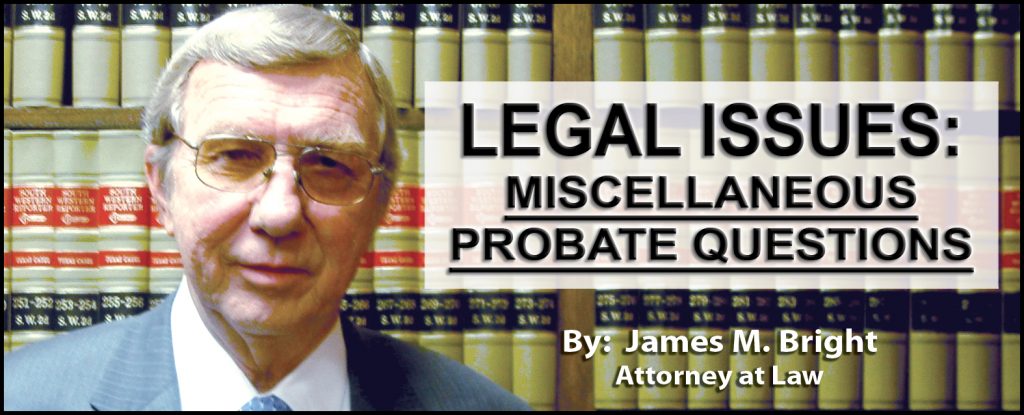The following is provided for informational purposes only and is not, nor should it be construed as legal advice.
The following is a list of common questions that are encountered in my law practice regarding estates and probate of Wills. The answers may vary depending upon circumstances of that particular client, but are offered as a guideline for situations which are not extraordinary.
What is the difference in legal title and equitable title and how do the differences relate to probate of estates? As applied to real property issues, equitable title gives the right to possess or use the real property, while legal title shows the person or persons on the deed. A common way that these dramatically different rights appear in probate is when one person (such as a surviving spouse) receives a life estate and remaindermen (children of the decedent or others) receive legal title. The result of this situation is that remaindermen hold legal title to real property that the surviving spouse has a right to occupy or possess. Technically, the remaindermen (children or other) can sell legal title, although the property would be encumbered by a life estate. In practice, the remaindermen are not likely to find a buyer who is willing to accept those conditions. As regards probate—these issues can be resolved by even a simple Will.
What are revocable life estate deeds (sometimes called “Lady Bird Deeds”)? This is a deed where a person grants a life estate in property to himself and grants legal title to his children or others. This instrument differs from a life estate in the fact that the grantor retains for himself the right to sell or encumber the property during his lifetime. The so-called “Lady Bird Deed” is often used in anticipation of application for Medicaid benefits. It attempts to transfer the property to descendants without making it subject to Medicaid reimbursement after the death of the grantor. These deeds, if done, must be with a full understanding that there may be title company objections. It should also be noted that if this vehicle is initiated as a shield to Medicaid Recovery, the Internal Revenue Service has a “look-back” period of 60 months.
It is also important to note that laws may change so that the so-called “Lady Bird Deed” may not be effective for its intended purpose.
Does a probate of a Will automatically transfer title to real property? The answer to this question depends upon the type of probate proceeding done. If the Will was probated as a Muniment of Title, then the answer is yes. Transfer of title to real property in Texas is essentially complete upon the filing of a certified copy of the Will together with a certified copy of the Court’s Order in the Real Property Records of the county where the real property is located.
If there were debts to be paid or other cause that an administration be opened, then transfer of title to real property is NOT automatic. Transfer of title to real property in this instance would be accomplished by signing and filing an executor or administrator’s deed. An executor or administrator’s deed is a deed wherein the grantor is also the executor or administrator that has been authorized by the Court to represent the estate of the decedent. The executor’s deed transfers title of the real property to the beneficiaries under the Will.
An example might be, husband dies; surviving wife is the executor and the beneficiary. In this case, wife, in her capacity as executor, signs a deed transferring husband’s ownership interest in real property to herself in her individual capacity.
This is an often overlooked duty of the executor. Being authorized by the court to act for the estate does not automatically transfer title to real property; it only gives the executor the authority to act.
The questions answered above cannot begin to answer all of the questions as they relate to your particular loved one’s estate. You are encouraged to have an experienced attorney of your choosing answer questions as they relate to you or your loved ones as well as to prepare documents which express your wishes at the time of your death.
James Bright has been admitted to practice before the Federal Courts for the Southern District of Texas and Eastern District of Texas as well as all of the Justice Courts, Probate Courts, County Courts at Law, District Courts, Courts of Appeal and Supreme Court for the State of Texas. He maintains an office in Houston and by appointment another at 208 McCown Street in the heart of historic Montgomery. Contact may be made by telephone (936) 449-4455 or (281) 586-8277. For more information about wills or probate in Texas, please see- www.houstontxprobate.com
IF YOU WISH TO SUGGEST A TOPIC FOR THIS COLUMN, SEND TO:
JAMES M. BRIGHT
14340 TORREY CHASE BLVD., SUITE 150
HOUSTON, TEXAS 77014
Email: topics@houstontxprobate.com
